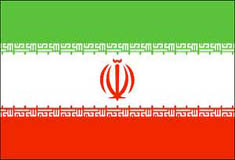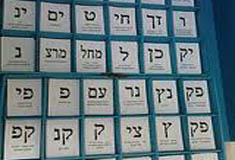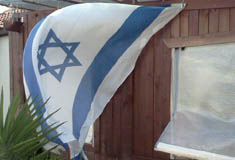Fateful Flight and Wings of Retribution: Was It an Accident or a Strategic Move?
הרב שי טחןיג אייר, תשפד21/05/2024Let's pray and hope that we'll soon experience what Zeresh said: when the enemies of Israel start to be defeated
תגיות:איראןמלחמהעם ישראל
It's hard to avoid seeing the similarity between what is happening recently in Iran and the holiday of Purim, which both took place in Persia. At that time, the Jews were persecuted by Haman, who was second to the king and wanted to kill all the Jews in one day. The result was that Haman was killed. Similarly, in our time, the second in command in Iran who tirelessly tried to kill all the Jews in one day with unconventional weapons was also killed.
the similarity between what is happening recently in Iran and the holiday of Purim, which both took place in Persia. At that time, the Jews were persecuted by Haman, who was second to the king and wanted to kill all the Jews in one day. The result was that Haman was killed. Similarly, in our time, the second in command in Iran who tirelessly tried to kill all the Jews in one day with unconventional weapons was also killed.
We also learn from the story of Esther that things happen in steps: first, Hashem elevates the Jews, and then He eliminates the wicked, as Zeresh told her husband Haman:"If Mordechai, before whom you have begun to fall, is of Jewish descent, you will not prevail against him but will continue to fall before him." The nature of the way Hashem operates is that when He starts turning the tables on the enemies of Am Yisrael, the tables are turned completely. Since we are beginning to see the downfall of the Iranians, it should continue to be so until we are completely elevated.
But why do things happen this way, with the downfall occurring in stages rather than all at once? The Vilna Gaon explains that Hashem's way is to first elevate us before He defeats our enemies, so that people around the world, especially our enemies, will see that Hashem is the one in control and that he favors Am Israel. He writes: "When Hashem saves His people Israel from their oppressors who stand against them, He first redeems them and does good to them. Afterwards, He avenges their vengeance against the enemies, as in Egypt, where He first redeemed them and then destroyed the Egyptians in the Sea of Reeds. Similarly, with Haman, He first did elevated Mordechai, and then He brought down Haman and hanged him, so that he himself would see the greatness of Israel and recognize that the Hashem is God throughout the earth.
And when He does good to the righteous, then the whole city rejoices but they still do not yet sing praises to Him. However, afterwards, when He takes vengeance on those who stand against them, then they sing praises.”
This important pattern should guide us today as our nation is fighting a war and BH defeating our vicious enemy. The enemy will be vanquished, completing the victory that expresses Kiddush Hashem.
Going back to the recent event: whether the helicopter accident with the president of Iran in it was an accident or the clean work of the Israeli Mossad, this week the world is a better place than last week with the absence of the wicked, evil butcher. But on second thought, since the wicked regime is still ruled by the Ayatollah, nothing might really change, and it could be business as usual. That might all be true when viewing things from a physical outlook, but when viewing from a spiritual outlook, we get a totally different picture.
There are various places where Chazal explain to us that wicked people cause Hashem to be angry at the world. For example, at the end of Gemara Sanhedrin(דף קיג, ב) , Chazal say that as long as the wicked exist in the world, there is wrath and rage in the world. On the opposite, when they are eliminated, good comes to the world. That is the reason King Shlomo says, "When the wicked perish there is joy" (משלי יא, י).
The words the Gemara keeps on repeating are "חרון אף." If we try to look for other sources in the Torah that use this term, we will get a clear picture of what happens when a wicked person dwells in this world. When Hashem approaches Moshe Rabbeinu and asks him to become the messenger to speak to Pharaoh, Moshe refuses again and again until Hashem becomes angry. The words in the pasuk are ויחר אף ה' במשה. But what happens when Hashem gets angry? Rashi tells us, in the name of Rabbi Yehoshua ben Korcha, that Hashem's anger carries a punishment. This can be explained with another place where Hashem got angry and the Torah uses the same חרון אף again. After the sin of the Golden Calf, Hashem was very angry and decided to destroy the entire nation. Moshe Rabbeinu then tells Him שוב מחרון אפך—to relent from His anger.
Another instance of Hashem having חרון אף was when Aharon and Miriam spoke about Moshe. Hashem rebuked them, got angry, and immediately left them. The result of Hashem leaving was that they were afflicted with tzaraat. This is because Hashem doesn't need to actively punish; rather, when He withdraws His providence from us, all the bad things come.
When Chazal tell us that as long as there are wicked people in the world there is חרון אף in the world, it is because the people in the world allow such people to exist and their cruel ideology to flourish. Thus, the people of the world are partially responsible for this cruelty. Therefore, Hashem can't dwell in such a world and He simply leaves, just as He left Miriam and Aharon when they spoke about Moshe, and then disasters come to the world. Thus, when the evil Haman of Persia of our generation is eliminated, the entire world benefits since Hashem's presence comes back. When Hashem comes back, good comes to the world, as the Gemara mentions(סוף סנהדרין) .
Rabbi Yosi mentions another approach to what happens when Hashem gets angry. When Moshe didn't accept Hashem's mission to go to Pharaoh, Hashem got angry, which led Him to punish Moshe by changing the leadership roles. Instead of Moshe being the Kohen and Aharon being the Levi, the roles were reversed, with Aharon becoming the Kohen and Moshe becoming the Levi. When we read those words, we might not fully understand the significance of who should be Kohen or Levi, and moreover, why it’s a punishment for Moshe, who was totally uninterested in any role and was doing all he could to avoid it. But since it’s a punishment, we must understand that it has negative implications, and that Klal Yisrael would have benefited much more if Moshe had been the Kohen.
Taking this idea to our time, we can conclude that according to Rabbi Yosi’s opinion, when Hashem is angry, He changes leadership in the world. Having the wrong leader can have catastrophic implications, such as open borders, a bad economy, a rise in antisemitism, and wars in Israel and around the world. That is all part of the חרון אף. But when the wicked person is killed, then good comes to the world, and in this context, it can very likely be a change in leadership for the better.
Let's pray and hope that we'll soon experience what Zeresh said: when the enemies of Israel start to be defeated, then they are completely defeated.

We also learn from the story of Esther that things happen in steps: first, Hashem elevates the Jews, and then He eliminates the wicked, as Zeresh told her husband Haman:"If Mordechai, before whom you have begun to fall, is of Jewish descent, you will not prevail against him but will continue to fall before him." The nature of the way Hashem operates is that when He starts turning the tables on the enemies of Am Yisrael, the tables are turned completely. Since we are beginning to see the downfall of the Iranians, it should continue to be so until we are completely elevated.
But why do things happen this way, with the downfall occurring in stages rather than all at once? The Vilna Gaon explains that Hashem's way is to first elevate us before He defeats our enemies, so that people around the world, especially our enemies, will see that Hashem is the one in control and that he favors Am Israel. He writes: "When Hashem saves His people Israel from their oppressors who stand against them, He first redeems them and does good to them. Afterwards, He avenges their vengeance against the enemies, as in Egypt, where He first redeemed them and then destroyed the Egyptians in the Sea of Reeds. Similarly, with Haman, He first did elevated Mordechai, and then He brought down Haman and hanged him, so that he himself would see the greatness of Israel and recognize that the Hashem is God throughout the earth.
And when He does good to the righteous, then the whole city rejoices but they still do not yet sing praises to Him. However, afterwards, when He takes vengeance on those who stand against them, then they sing praises.”
This important pattern should guide us today as our nation is fighting a war and BH defeating our vicious enemy. The enemy will be vanquished, completing the victory that expresses Kiddush Hashem.
Going back to the recent event: whether the helicopter accident with the president of Iran in it was an accident or the clean work of the Israeli Mossad, this week the world is a better place than last week with the absence of the wicked, evil butcher. But on second thought, since the wicked regime is still ruled by the Ayatollah, nothing might really change, and it could be business as usual. That might all be true when viewing things from a physical outlook, but when viewing from a spiritual outlook, we get a totally different picture.
There are various places where Chazal explain to us that wicked people cause Hashem to be angry at the world. For example, at the end of Gemara Sanhedrin(דף קיג, ב) , Chazal say that as long as the wicked exist in the world, there is wrath and rage in the world. On the opposite, when they are eliminated, good comes to the world. That is the reason King Shlomo says, "When the wicked perish there is joy" (משלי יא, י).
The words the Gemara keeps on repeating are "חרון אף." If we try to look for other sources in the Torah that use this term, we will get a clear picture of what happens when a wicked person dwells in this world. When Hashem approaches Moshe Rabbeinu and asks him to become the messenger to speak to Pharaoh, Moshe refuses again and again until Hashem becomes angry. The words in the pasuk are ויחר אף ה' במשה. But what happens when Hashem gets angry? Rashi tells us, in the name of Rabbi Yehoshua ben Korcha, that Hashem's anger carries a punishment. This can be explained with another place where Hashem got angry and the Torah uses the same חרון אף again. After the sin of the Golden Calf, Hashem was very angry and decided to destroy the entire nation. Moshe Rabbeinu then tells Him שוב מחרון אפך—to relent from His anger.
Another instance of Hashem having חרון אף was when Aharon and Miriam spoke about Moshe. Hashem rebuked them, got angry, and immediately left them. The result of Hashem leaving was that they were afflicted with tzaraat. This is because Hashem doesn't need to actively punish; rather, when He withdraws His providence from us, all the bad things come.
When Chazal tell us that as long as there are wicked people in the world there is חרון אף in the world, it is because the people in the world allow such people to exist and their cruel ideology to flourish. Thus, the people of the world are partially responsible for this cruelty. Therefore, Hashem can't dwell in such a world and He simply leaves, just as He left Miriam and Aharon when they spoke about Moshe, and then disasters come to the world. Thus, when the evil Haman of Persia of our generation is eliminated, the entire world benefits since Hashem's presence comes back. When Hashem comes back, good comes to the world, as the Gemara mentions(סוף סנהדרין) .
Rabbi Yosi mentions another approach to what happens when Hashem gets angry. When Moshe didn't accept Hashem's mission to go to Pharaoh, Hashem got angry, which led Him to punish Moshe by changing the leadership roles. Instead of Moshe being the Kohen and Aharon being the Levi, the roles were reversed, with Aharon becoming the Kohen and Moshe becoming the Levi. When we read those words, we might not fully understand the significance of who should be Kohen or Levi, and moreover, why it’s a punishment for Moshe, who was totally uninterested in any role and was doing all he could to avoid it. But since it’s a punishment, we must understand that it has negative implications, and that Klal Yisrael would have benefited much more if Moshe had been the Kohen.
Taking this idea to our time, we can conclude that according to Rabbi Yosi’s opinion, when Hashem is angry, He changes leadership in the world. Having the wrong leader can have catastrophic implications, such as open borders, a bad economy, a rise in antisemitism, and wars in Israel and around the world. That is all part of the חרון אף. But when the wicked person is killed, then good comes to the world, and in this context, it can very likely be a change in leadership for the better.
Let's pray and hope that we'll soon experience what Zeresh said: when the enemies of Israel start to be defeated, then they are completely defeated.
הוסף תגובה
עוד מהרב שי טחן
עוד בנושא מחשבה







.jpg)
